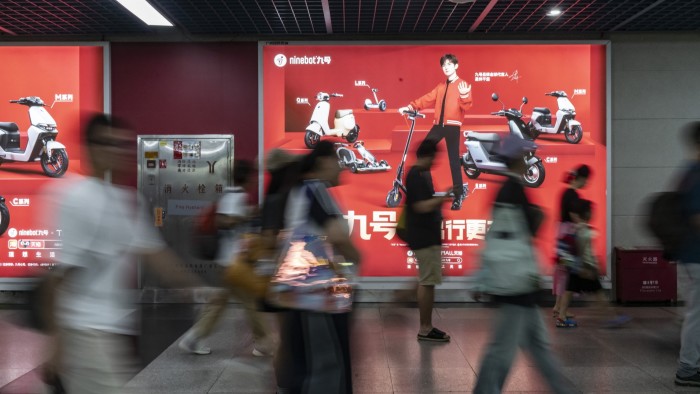Stay informed with free updates
Simply sign up to the Chinese economy myFT Digest — delivered directly to your inbox.
China’s stocks rose and bond yields fell after the country’s leaders changed their stance on monetary policy to “moderately loose” from “prudent” for the first time in 14 years to boost an economy teetering on deflation.
The announcement from the Communist party’s politburo, which is headed by Xi Jinping, comes as leaders prepare to hold their annual meeting this month to lay out the economic agenda for next year.
The party next year “must implement more proactive fiscal policies and moderately loose monetary policies,” the government said in a statement.
It added that authorities needed to “strengthen extraordinary countercyclical adjustments and . . . vigorously boost consumption, improve investment efficiency and expand domestic demand in all directions”.
China’s 10-year bond yields reached a record low of 1.92 per cent, continuing a sweeping rally and defying warnings of a “bubble” in government bond prices. Bond yields move inversely to prices. Hong Kong’s Hang Seng China Enterprises stock index closed up 3.14 per cent after the policy announcements.
“To escape the debt-deflation loop, Chinese policymakers need to ramp up fiscal measures to boost consumption,” said analysts at Brown Brothers Harriman. “As such, the latest politburo announcement is encouraging.”
China last adopted an “moderately loose” stance in late 2008 after the global financial crisis and ended it in late 2010. The change of stance on Monday was taken by investors as a sign the leadership was taking China’s economic problems more seriously.
The Chinese economy has been dogged by deflationary pressures for months on the back of a property slump, prompting the government to announce a monetary stimulus in September and fiscal measures in November mainly targeting local government debt.
The economy flirted with outright deflation in November, data released on Monday showed, adding to pressure on Communist party officials to do more to revive consumer sentiment.
China’s consumer price index rose 0.2 per cent year on year, a five-month low and below a Reuters poll of analysts that forecast a gain of 0.5 per cent. On a month-on-month basis, prices dropped 0.6 per cent from October to November.
The country’s producer price index, which measures the prices of goods sold by Chinese manufacturers, declined 2.5 per cent year on year, compared with analysts’ forecasts for a 2.8 per cent drop and a decline of 2.9 per cent in October, continuing a two-year run of falling factory gate prices.
The Communist party is expected to hold one of its top annual economic policy meetings, the Central Economic Work Conference, in the coming days, with analysts waiting eagerly for any signs of a more concerted push to revive household spending.
“The Chinese economy continues to flirt with deflation, highlighting the inadequacy of the stimulus measures thus far in restoring private sector confidence, reviving domestic demand and putting growth back on track,”
said Eswar Prasad, professor at Cornell University.
He said the work conference offered an opportunity for the government to “present a broader package of targeted fiscal stimulus and reform measures” to boost growth and reduce the risk of “deflationary pressures becoming entrenched”.
Beijing’s stimulus measures in the past few months have included monetary measures to boost the stock market, interest rate cuts for mortgage holders and an easing of restrictions on homebuying.
The central government also announced a Rmb10tn ($1.4tn) debt swap plan that aims to enable local governments to catch up on salary and supplier payments that have fallen into arrears.
But a growing number of economists and scholars in China are calling for greater efforts to lift household spending beyond the government’s existing programmes, which have focused on subsidising consumers to upgrade home appliances or buy new vehicles.
Some hope the Central Economic Work Conference will focus on these concerns, though the high-level leadership meeting is more likely to signal the direction of policy rather than include detailed announcements.
“We expect policymakers to show rising concerns on growth headwinds and signal further stimulus to boost domestic demand and stabilise growth, with more focus on consumption, risk containment and high-tech manufacturing,” said analysts at Goldman Sachs.
Additional reporting by Wenjie Ding in Beijing
Read the full article here

